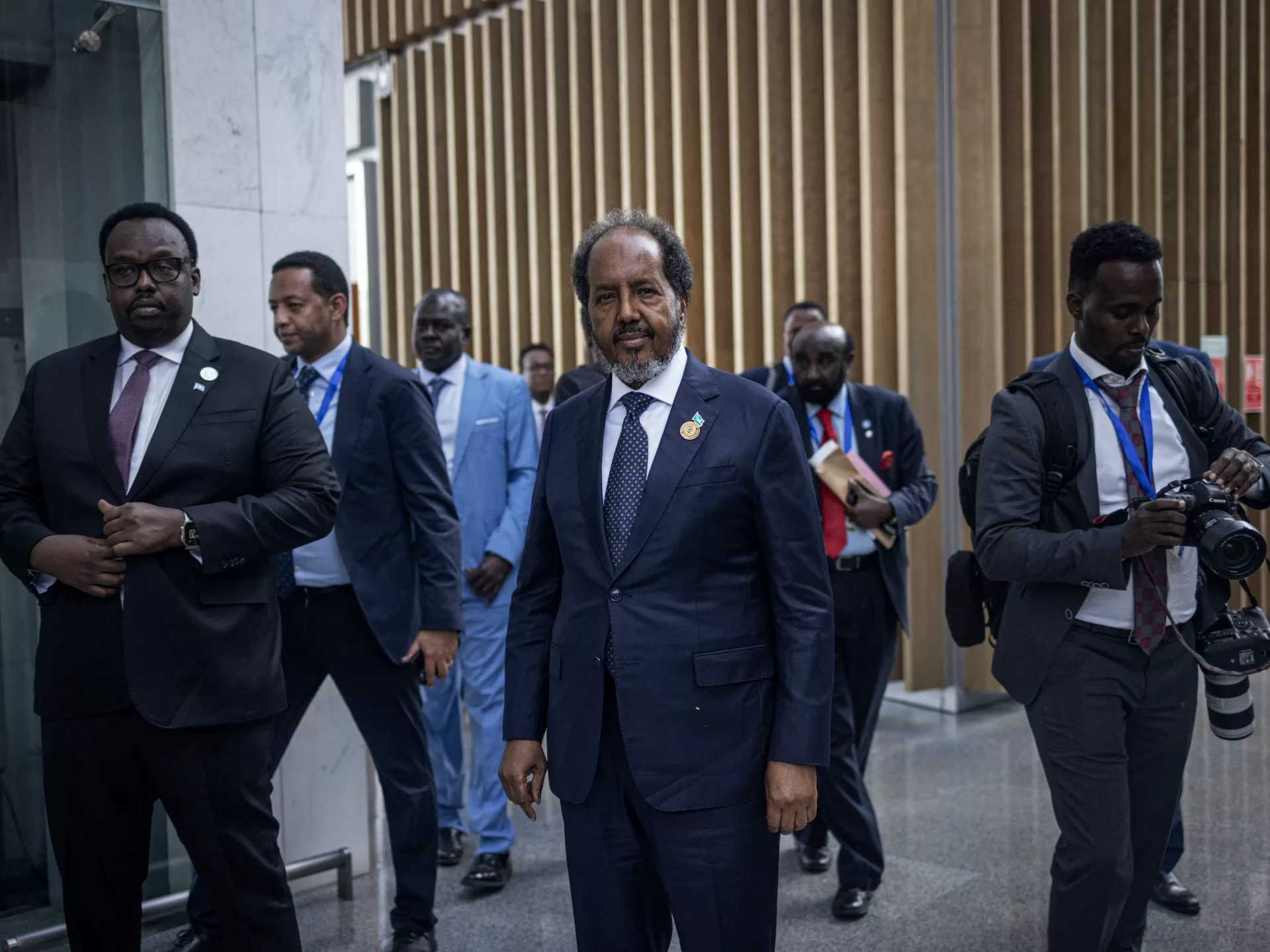President Mohamud ‘categorically objects’ to Ethiopia’s Red Sea port deal with Somaliland, territory Somalia claims as its own.
Speaking at the African Union summit in Ethiopia’s capital, Addis Ababa on Saturday, Mohamud also said Ethiopian security forces tried to block his access to the summit amid a dispute between the two countries.
The agreement between Ethiopia and Somaliland signed on January 1 “is nothing more than annexing part of Somalia to Ethiopia, and changing the borders of Somalia,” Mohamud told reporters. “Somalia categorically objects to that.”
As part of the deal, signed by Ethiopian Prime Minister Abiy Ahmed and Somaliland’s leader Muse Bihi Abdi, Somaliland grants Ethiopia a 50-year lease on a naval base with access to Somaliland’s Berbera port for commercial marine operations.
Neither side has made the terms of the deal public, but it appears to give Ethiopia the right to build a port in Somaliland in exchange for recognition.
Somaliland has enjoyed de facto independence for three decades, but Somalia considers the self-governing region and its four million people to be a part of its northern territory.
Mogadishu regards any international recognition of Somaliland as an attack on Somalia’s sovereignty, and the Somali government has called the port deal with Addis Ababa “outrageous” and “unauthorised”.
“Ethiopia is misleading the world by claiming that they need an access to the sea,” Mohamud said on Saturday. “The question is not an access to the sea. The question is how Ethiopia wants access to the sea.”
He claimed senior officers from Ethiopia’s military were in Somaliland “preparing the ground” for the territory’s annexation. It was not possible to verify his allegation.
Somalia has suggested it would be prepared to go to war to stop Ethiopia from building a port in Somaliland. But Ethiopia’s Abiy has played down fears of an armed conflict over the Somaliland deal, telling lawmakers earlier this month that he had “no intention” of going to war with Somalia.
‘Provocation’
Reporting from Addis Ababa on Saturday, Al Jazeera’s Mohamed Vall noted that Somalia’s president had been very outspoken in his remarks at the AU Summit.
“[Mohamud] accused Ethiopia not just looking for access to the sea in a normal way, because Ethiopia has lots of other neighbours who have access to the sea, who have sea shores … The real purpose, he said, of Ethiopia’s [deal] is to annex Somaliland, which is a part of the sovereign republic of Somalia,” Vall said.
“The Somali president condemned the behaviour of the Ethiopian government, saying that they have even tried to block his access to the venue of the summit today,” our correspondent added. “He wondered how can this happen in a country that hosts the AU, an organisation based on equality between African states and the freedom of the leaders coming here to access the summit.”
Mohamud, attending the 37th summit of the AU, said that Ethiopian security services tried to block him from leaving his hotel in Addis Ababa on Saturday morning, forcing him to travel in the convoy of Djibouti’s president.
When the pair arrived at the AU headquarters, armed guards tried to prevent them from entering the building, Mohamud said, describing the alleged action as “provocation”.
Ethiopia however said it had “warmly welcomed” Mohamud and accorded him the full honours of visiting heads of state and governments to the summit.
Prime Minister Abiy’s spokesperson Billene Seyoum told the AFP news agency that the Somalia delegation was blocked when its security detail tried to enter a venue with weapons.
“The Somali delegation security attempted to enter the AUC premises with weapons which was blocked off by AUC security,” she said.
As African leaders convene in Ethiopia for the AU summit, Palestinian Prime Minister Mohammad Shtayyeh also attended the two-day gathering and raised the issue of Israel’s war in Gaza with leaders of the AU who remain divided over their support for Palestine.
